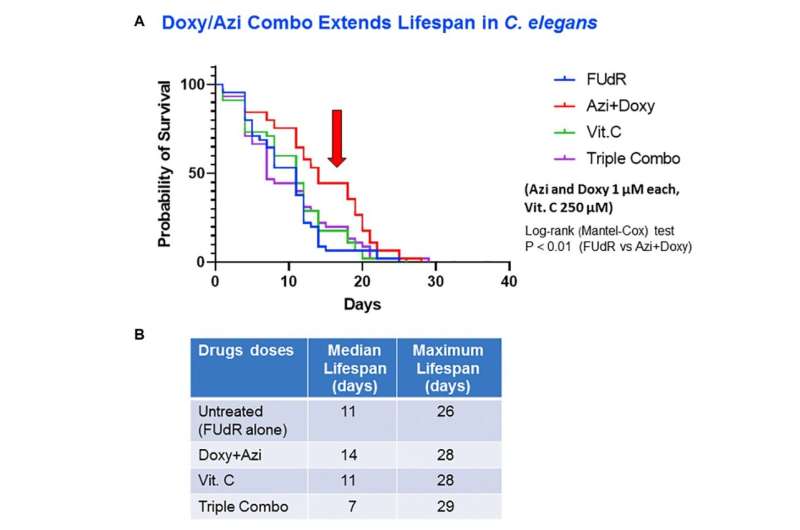This article has been reviewed according to Science X's editorial process and policies. Editors have highlighted the following attributes while ensuring the content's credibility:
fact-checked
proofread
Mitochondria-targeting antibiotics extend lifespan in C. elegans study

A new research paper titled "Antibiotics that target mitochondria extend lifespan in C. elegans" has been published in Aging.
Aging is a continuous degenerative process caused by a progressive decline of cell and tissue functions in an organism. It is induced by the accumulation of damage that affects normal cellular processes, ultimately leading to cell death. It has been speculated for many years that mitochondria play a key role in the aging process.
In this new study, researchers Gloria Bonuccelli, Darren R. Brooks, Sally Shepherd, Federica Sotgia, and Michael P. Lisanti from the University of Salford aimed to characterize the implications of mitochondria in aging using Caenorhabditis elegans (C. elegans) as an organismal model. The C. elegans were treated with a panel of mitochondrial inhibitors and assessed for survival.
"In our study, we assessed survival by evaluating worm lifespan, and we assessed aging markers by evaluating the pharyngeal muscle contraction, the accumulation of lipofuscin pigment and ATP levels," the researchers explain.
Their results show that treatment of worms with either doxycycline, azithromycin (inhibitors of the small and the large mitochondrial ribosomes, respectively), or a combination of both, significantly extended median lifespan of C. elegans, enhanced their pharyngeal pumping rate, reduced their lipofuscin content and their energy consumption (ATP levels), as compared to control untreated worms, suggesting an aging-abrogating effect for these drugs.
Similarly, DPI, an inhibitor of mitochondrial complex I and II, was capable of prolonging the median lifespan of treated worms. On the other hand, subjecting worms to vitamin C, a pro-oxidant, failed to extend the lifespan of C. elegans and upregulated its energy consumption, revealing an increase in ATP level.
"Therefore, our longevity study reveals that mitochondrial inhibitors (i.e., mitochondria-targeting antibiotics) could abrogate aging and extend lifespan in C. elegans," the researchers conclude.
More information: Gloria Bonuccelli et al, Antibiotics that target mitochondria extend lifespan in C. elegans, Aging (2023). DOI: 10.18632/aging.205229



















